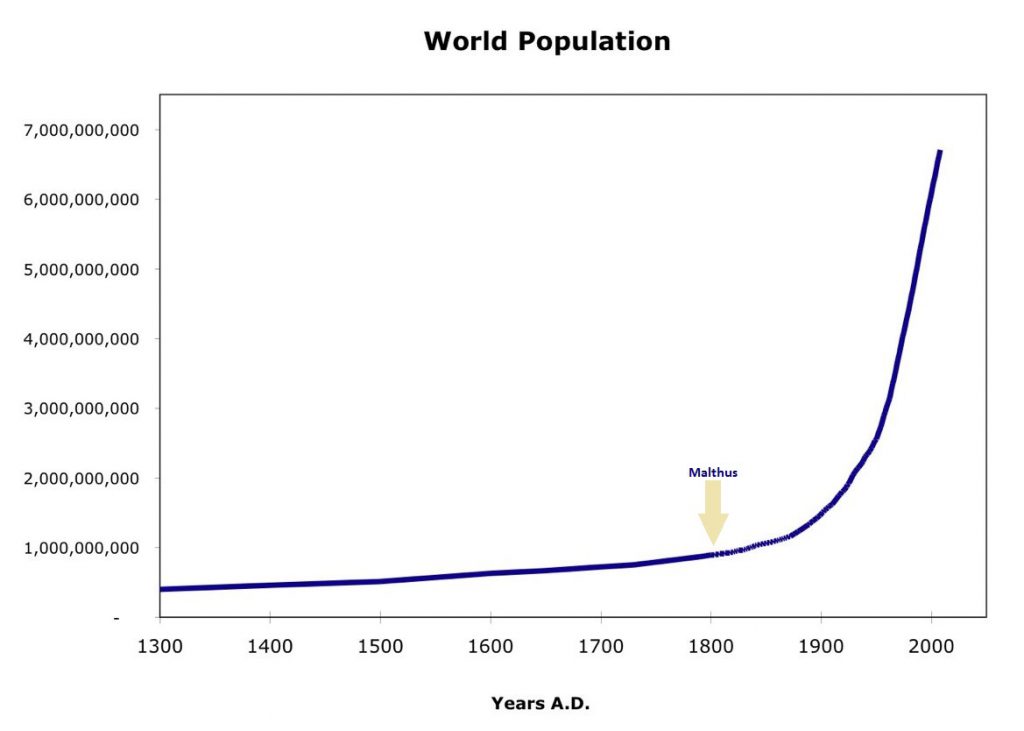Resource shortages and peak oil! Will there be a Malthusian catastrophe? Will the western empire collapse like the roman empire did? There are lots of people who seem to think that it may. The idea of resource shortage is not new. It was the subject of the Club of Rome report (Limits to Growth, 1972) and, for example, also the main theme in the film Soylent Green. In the film (from 1973), they already discuss global warming too.
If population growth is exponential and food production growth is linear, the former will grow much faster than the latter, over time. As the need for food growths with the population, it will out-grow food production and population growth will hit a limit. Thomas Malthus is most famous for describing this process.
Unrestricted population growth is exponential: there will be a certain percentage growth in each year. Where Malthus appears to have been mistaken is in the growth of food production. This technological development has more or less been exponential since he wrote his book in 1798. Population has therefore been able to grow exponentially as well.
This is not the way it has been in history, though. At the time of writing, Malthus had observed several episodes in the history of population growth where his theories held. Technological development from the end of the Roman Empire throughout the middle ages had been slow (linear?). Population growth was slow too. Malthus observed a quickly expanding population at his time and was worried. He predicted a collapse through, for example, famine, war, disease or vice.

In the 200 years after he wrote, this did not happen. Wars did happen, as did famines. But they never did have much influence over the longer term growth. Population actually increased nearly exponentially.
Why was Malthus wrong?
To put a long story short: humankind discovered a lot of readily available energy (fossil fuels) which was stored in the earth after slowly collecting for millions of years. The usage of all this stored energy within a short timeframe allowed for a lot of automated production. Through the availability of people that were now not needed for (food) production, development stepped up as well. (green revolution etc.) Population was allowed to grow accordingly.
Unfortunately, the build up of this energy source over millions of years had been much slower than its ever quickening extraction. The extraction period is most likely just a few hundreds of years. As the new build-up is way too slow, at some point the fossil fuels bonanza will end.
So, even though Malthus was wrong on the technological development growth and energy availability in the period after he wrote his book, it would be unwise to completely discount his theory just yet. Fossil fuels will run out and as we do not yet know whether another technology will take its place, the question is merited whether there will be a Malthusian catastrophe in the end.
Population decline
Looking at history, there have been catastophes. War, pestilence and famines were not uncommon in the middle ages. Some of them (for example the black death of the 1300’s) reduced population a lot too. There have also been much longer streches of population decline. The large pest pandemic of 1348, for example, was followed by about 100 years of slow population decline.
English Population (m)

It appears there have been long periods in the past where there were so few births that the population actually declined.
Recent fertility rates
Jeremy Grantham, in this article, also points out that recently populations of western countries have actually been declining or are expected to decline imminently. It is visible in most western countries’ birth-rates, which are now generally below the necessary replacement rates. This is obviously a drag on total measured GDP and that causes concern with some people.
But the question that needs to be asked is: Why has fertility been declining? Why do we get fewer children than we used to? Why does this happen over longer periods of time?
People in their child-bearing 20-30s must be key here. They have fewer children nowadays and we could just ask them why. Right? Well, we would also need to ask people from 100 years ago why they got more children…
Feeding the children cannot be a problem in most rich countries, but maybe housing is more difficult. Housing is more expensive because of a more dense population now. But then, in rich countries with lower population densities, fertility rates are declining as well.
Maybe there is a clue in the song Bobby Brown by Frank Zappa. This is a song from 1978 and it is about women’s liberation and what Zappa thinks are its consequences: sexual depravity. Maybe vice is a sign of the times before population decline happens. The Romans before the collapse of empire, the Italians around 1350, the roaring 20s… during or after the following collapse, sometimes the people find a leader who will preach a return to virtuous values (or religion) to regain growth.
Growth!
For real growth, things must be built. When a population grows, it needs more houses, more roads, more industry. This building was (or is?) generally done by men. Women bore children and usually depended on the men to build houses. Assuming this has been the case in the past, if a population wanted to grow quicker, it would need more men. If a population does not grow, men seem less needed. You only need very few men to keep a population from declining when the infrastructure has been built. You will still need all the women to reproduce though!
Ambrose Evans-Pritchard observes about Japan (toward the end of the article): “The reason why marriage rates among those in their 20s and 30s keeps falling is because work has become precarious. Ever fewer young men have tenure track jobs, which makes them less marriageable. They join the army of “Parasite Singles”, some 3m aged 35-44 living with their parents.
The women themselves defer marriage in the hope of finding Mr Salaryman. Deflation and demography have been feeding on each other. “
So, is it true that in a static or declining population men are less needed and the negotiation position of women strengthens? Zappa in Bobby Brown: “womens liberation came across the nation…”. [Side note: Against popular myth, I do not think womens liberation was caused by the advent of condoms: the history of condoms is much longer: even the Romans had them!]
What do men and women want?
Men and women want many things, off-course… But, for relevancy here, women may actually choose to have fewer children than men. Having children is a lot more effort for women than men and it causes bodily harm as well. A few children is fine, but why a lot? Especially when more of them survive into adulthood. Men may think differently. The more children the better, really. Especially when affordable.
In societies where women’s negotiation position strengthens, men will probably lose some freedom. Family protection may become stronger. Women may choose laws that tie men into the family and also choose to have fewer children. Women may favor more rules in general: they seem to like stability more than men. Women also seem more risk adverse.
If this is the case, in societies where the men-women negotiation positions change, the way society is organised will change accordingly. The fertility rates may change alongside.
This may also help explain the baby-boom after the second world war. As there was a general lack of men this meant the negotiation position moved in favor of them. Women had to adopt and families with 6 or more children were no exception. The baby-boom lasted much longer than can be explained by postponed reproduction from the war years.
Where are we now?
It seems that the role of men has been weakening in the last few decades. In the current economic crisis, men are loosing their jobs faster than women. The crisis is worst in industries that are used for growth (f.e. building), where a lot of men work. Men become less interesting to women and marriage is delayed. The number of marriages is decreasing, divorces are increasing and the average age at marriage is increasing.
These facts could be consequences of resource-shortages, causing a shift in negotiation power between men-women, which is then changing society. The outcome of this is a reduced fertility rate.
The awakening to resource shortage is symptomized in the ideas behind Soylent Green from 1973, society’s reaction is shown by Bobby Brown in 1978.
It looks like a kind of slow motion Malthusian catastrophe has been happening for the past 50 years.